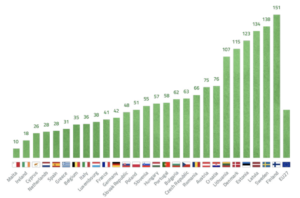Breaking Free: how bioenergy empowers communities to escape fossil fuel dependency

Bioenergy Day means that, from the specified date onwards, bioenergy alone has the potential to fulfil the EU’s energy needs for the rest of the year.
Every EU country has its own National Bioenergy Day to highlight how bioenergy has empowered communities to break away from fossil fuels and save on the emission of greenhouse gases (GHG) and energy bills.
Lithuania, which celebrated its Bioenergy Day on 15 September, is the perfect example. Over the past 20 years, it has transitioned from an energy system mainly depending on gas imports from Russia to one mainly powered by bioenergy, a locally sourced solution.
Today, the use of biomass in Lithuania’s district heating sector is up to 75%. Four-fifths (80%) of households and one third of the national industries use biomass fuels.
The transition from imported gas to local biomass fuel has resulted in a cost reduction of an average 40% on the cities’ energy bills and 70% decrease in CO2 emissions.
During the...


















